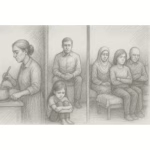They were told they could be anything. That the world was theirs if they worked hard enough, stayed in school, smiled during interviews, and never stopped improving themselves. They were told they were the future. And yet now, these same young people lie awake at three in the morning, scrolling endlessly on phones they can’t afford to replace, sitting at desks that never belonged to them, sipping third cups of instant coffee just to keep their heads up for another shift they don’t believe in.
In Seoul, a young woman wakes before dawn to catch two trains and a bus to a job that pays just enough to survive but not enough to leave home. She puts on light makeup, ties her hair back neatly, and tells herself, “You’re lucky to have work.” At the office, she bows to a boss who never remembers her name. She types until her wrists ache. She eats lunch alone. At the end of the day, she doesn’t cry. She is too tired to cry. She watches mukbang videos to simulate the feeling of not being alone.
In Tokyo, a man in his early thirties collapses from exhaustion outside a train station. He hasn’t seen his family in months. He works fourteen hours a day, sometimes more. His mother calls, leaves voicemails with soft, worried words. He never calls back. He is ashamed. He was supposed to succeed. He was the golden child. But somewhere between cram school and corporate loyalty, something in him folded and never stood back up.
In London, a woman with three degrees works at a job she hates, not because she is ungrateful, but because quitting means starting from nothing again. Her rent is more than half her salary. She buys therapy on discount, “pay what you can” sessions through Instagram links. She writes poetry at night but doesn’t show anyone. Who has time for art when your body is already late on bills?
They are everywhere. This burnout generation. Dressed in oversized hoodies, sneakers with worn-out soles, clutching eco-bags filled with vitamins and antidepressants. They listen to motivational podcasts on the way to nowhere. They practice mindfulness but can’t remember what it feels like to breathe freely. They are brilliant. They are creative. They are broken.
The system tells them, “It’s your fault.” You’re not managing your time well. You need better habits. Wake up at five. Drink celery juice. Meditate. Journal. Take cold showers. Smile more. Network better. Learn to code. Learn Korean. Learn to market yourself. Become a brand. Become useful. Become profitable.
But how do you heal in a world that sees your exhaustion as laziness?
They were raised on dreams and expectations. On Disney morals and startup fantasies. On the idea that passion pays, and passion never sleeps. But in reality, passion does not pay rent. Passion doesn’t cover student debt. Passion doesn’t help when your landlord increases the rent by 30% overnight.
In Finland, even where basic needs are met, the pressure to be mentally stable, socially capable, and constantly “okay” becomes another kind of weight. The silence of polite society feels like concrete. Therapy is encouraged but still hidden. Depression is spoken of in soft voices, behind closed doors, with eyebrows raised ever so slightly. You are allowed to be tired—but not for too long. Not publicly.
In the United States, the burnout looks louder. People cry in cars, record themselves breaking down, upload the pain as content. Grief becomes viral. Struggle becomes a marketing angle. “Buy my course on how I beat burnout.” But the pain is real. Behind the filters and thumbnails, real bodies are falling apart. Heart palpitations at 28. Hair loss. Panic attacks in Whole Foods. Loneliness is so thick it coats the lungs like fog.
In Japan, the word karōshi exists—death by overwork. Not metaphorically. Literally. Men found dead at their desks, their screens still lit. In South Korea, they call it 공허하다—a feeling of emptiness so deep it doesn’t even have to be tragic. Just numb. Just a blank room you can’t escape.
And still, they wake up. They answer emails. They say yes. They say “I’m fine.” They send laughing emojis even when their hands shake.
Many of them don’t want wealth or fame. They just want rest. Real rest. The kind of rest that doesn’t come with guilt. The kind of rest that lets the shoulders drop, lets the brain stop spinning like a machine on fire. They want space to be messy without being punished. They want love that doesn’t ask for performance. They want a world where being human is not a disadvantage.
Some have stopped dreaming. Others are trying to return to something simpler. A small cafe. A piece of land. A life with fewer tabs open. But even simplicity has become expensive. Even silence is a luxury not everyone can afford.
They are not lazy. They are not entitled. They are the children of collapsed economies, digitized everything, and endless comparison. They are the product of broken promises. Raised to believe they could be anything, only to realize the game was rigged from the start.
And yet—there is beauty in their tiredness. In their ability to keep going when nothing makes sense. In the way they still pet cats on the street. In the way they water plants. In how they light candles at night and hold onto music, memes, and fleeting softness. In their dark jokes, their stubborn kindness, their small, quiet hope.
They are burning. Yes. But they are also glowing. Still here. Still breathing.
Still trying.


